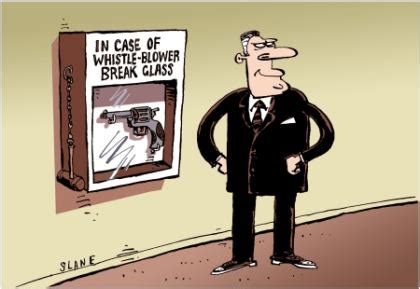Whistleblowers Australia |
Psychiatric Examinations
Harnessing ordinary grief and upset to your purpose
Many whistleblowers persist when many would say, "let it go". It may be
sensible, even prudent, to do so, even if only as a temporary strategy.
However, most employers, opportunistically paint that persistence as a
failing. For example, they say it is a failure to be a team player, or
a symptom of a burgeoning adjustment or personality disorder.
Either way, whistleblowers need to understand that. Generally speaking,
if you and your employer don’t agree about there being a need for a
psychiatric assessment, then it is probably because there is no need.
Your employer is probably trying to make out that you’re suffering from
a mental disability so as to get rid of you and destroy your
credibility.
It’s a convenience and the whistleblower is right to be upset, or even
angry, and to resist. It is wrong for your employer to coerce and abuse
an employee in this way and it’s perfectly normal for a person to have
trouble adjusting to the unhappy truth that your employer and even some
of your workmates are very willing to do the wrong thing and, more
seriously, to rort the workers' compensation system in this way.
The key here is for the whistleblower to understand and appreciate that
when you are accused of failing to let things go, as if that was the
norm, you should be saying that you are having difficulty adjusting to
being coerced and forced out and that your difficulties here are
entirely reasonable and to be expected, and, finally, that the cure is
there for all to see. The employer need only address itself to the
investigation of your allegations, which you made in the public’s
interest in line with its responsibilities and the usual norms of
integrity, accountability and common decency.
What, you might ask, has this to do with a 'fitness-to-continue'
assessment? Well, too many psychiatrists and psychologists fail to
distinguish between ordinary anger, upset and grief over unresolved
industrial matters and mental illness. They wrongly assume
the employer’s version has to be right, when they should be handing the
request back until such a time as the employee and employer are as one
on the employee’s industrial history. Inevitably, when they fail to
adhere to this discipline, they risk being seen as 'hired guns'.
Conduct of forensic (not therapeutic) consultations
In the absence of any workers' compensation claim, your employer may
require you to attend a 'fitness-to-continue' assessment in
circumstances of, say, extensive unplanned sick leave, but your
employer must allow you to attend your own doctor if you prefer.
If you want to have a support person with you and for the process to be
recorded (with a copy to you), the doctor should agree. Refer to the
guidelines on the web pages under Civil Remedies, Other
Ways to Blow the Whistle, Resources and Overseas:
Whistleblowers - In the Public Interest for the respective
ethical and professional guidelines. If not, the employer must refer
you to another doctor.
Ascertain whether the doctor has been supplied with the same documents
you were. If not, ask for the consultation to be postponed until the
documents are made available, with sufficient time for you to consider
them and raise an objection if required.
If there is no agreement between you and your employer as to the
industrial history and the need for an assessment, ask the doctor to
defer the consultation until such a time as there is agreement and take
your leave.
Alternatively, continue with the assessment but, either way, inform the
doctor why you think the two versions differ factually. When asked,
explain that you are having difficulty with adjusting to being forced
out of your employment in reprisal for speaking out in the public’s
interest and that you think that anger, disappointment, and even grief,
with symptoms like anxiety and depression, are neither unusual nor
unexpected in these circumstances.
Be reasonable at all times and prepared to concede that others may have
a different view. In this way, you go some way to establishing your
bona fides and general credibility. Make sure you understand the
question before you respond and rely only on the facts as you know
them. Don’t speculate or offer an opinion, unless you’re prepared to
acknowledge that at the time.
Getting back to work
Understand that if you want to return to work, you need to appreciate
that, while you think your employer has acted shamelessly, s/he isn’t
the first and obviously won’t be the last, so that (when asked) you can
say you can work with them again. Remember, you don’t have to like or
respect them; you just have to be courteous and put work first in your
dealings with them. That’s do-able and it’s all that an employer can
ask of you, anyway.
In other words, don’t take the position that your return to work is
conditional on the employer making sure you are never bullied and
harassed again, because that is not possible. Instead, ask for the
thing that is possible: Ask the employer to ensure that they’ll deal
with any complaint you might make in the future fairly, and in line
with their policy and procedure.
If you don’t, you give your employer an irresistible opportunity to
decline to have you back, because (they say) they cannot possibly
guarantee that it will never happen again. It doesn’t say much for your
employer. They could explain they will have you back and undertake to
do the right thing by you if there is a next time, but they won’t.
You’ve given them a convenient excuse and they’ll take it. So, get
thinking. Be more strategic.
